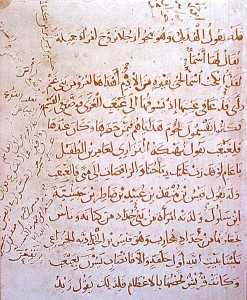Book: Ibn al-Kalbi’s “Book of the Horse” (ca. 800 AD)
 These days, I have been enjoying reading excerpts of Hisham Ibn al-Kalbi‘s “Ansab al-khayl fi al-Jahiliyah wa-al-Islam wa-akhbaruha” in my spare time. This roughly translates as “The genealogies and accounts of horses in the era before Islam and after the rise of Islam”, and is commonly known as “Kitab al-Khayl” (the “Book of Horses”).
These days, I have been enjoying reading excerpts of Hisham Ibn al-Kalbi‘s “Ansab al-khayl fi al-Jahiliyah wa-al-Islam wa-akhbaruha” in my spare time. This roughly translates as “The genealogies and accounts of horses in the era before Islam and after the rise of Islam”, and is commonly known as “Kitab al-Khayl” (the “Book of Horses”).
This precious work was written more than 1,200 years ago (yes, twelve hundred years ago) by one of the most prolific and knowledgeable medieval Islamic historians and genealogists. Every one of the 140 books Ibn Al-Kalbi (757 AD -819 AD) wrote is now lost, except two books that miraculously survived: the “Book of Horses” and the more famous “Book of Idols“.
A manuscript version of the “Book of Horses” was published in Arabic, first in 1946, then in 1964. If you happen to read Arabic and live in the USA, here is a list of a few libraries where you can find a copy. I xeroxed mine from the Georgetown University Library. Another manuscript version was also translated to French and published by E.J. Brill Publishers in Leyden, Germany, in 1928.
The “Book of Horses” revisits the stories of the most famous horses in pre-Islamic times (before 610 AD) and in the period immediately after Islam, up to Ibn al-Kalbi’s own era, 150 years after the rise of Islam. It also cites verses of Arabic poetry in which these horses and their descendants are mentioned. It provides the earliest known version of the famous mythological accounts of the origin of Arabian horses, such as the story of the domestication of the horse by Ishmael son of Abraham, and the story of the horses of King Solomon. It does not say anything about the legend of al-Khamsa — the five mares of the Prophet Muhammad — and for good reason: that legend is much more recent than the times Ibn al-Kalbi was writing about and the times he lived in.
In the time of Ibn al-Kalbi, Arabian horse strains were still transmitted in the sire line, as in the case of the English Thoroughbred today. The “Book of Horses” mentions mares from the “strain of Lahiq”, and the “strain of A’waj”, two famous steeds in pre-Islamic times. The legend of al-Khamsa, by contrast, has all of today’s Arabian horses tracing to five mares: a Kuhaylah, a ‘Ubayyah, and three others that change from one version of the legend to the other. Since today’s strains – Kuhaylan, ‘Ubayyan, Hadban, etc – are (only) 450 years old, it is reasonable to assume that the al-Khamsa legend is either as old as the strains themselves or more recent.
Pity the “Book of Horses” has never been translated to the English language. There are small excerpts of it in Lady Wentworth’s “The Authentic Arabian Horse”, perhaps from the book her mother Lady Anne Blunt wrote and never got to publish (The one known as the “Book of Fragments”). Perhaps someone needs to release me from my current job, lock me up in a room for six months (with plenty of horses around) and force me to translate it. That’s what I’d call time well spent.
Good Morning Edouard,
C’mon… by the looks of it you have written all your articles in a matter of months so what keeps you from using the coming Christmas Holiday to retreat and quickly translate the work? You can’t leave us hanging like this!
How can you even go to bed each evening knowing you haven’t done it yet?
;-D
Stop, you’re starting to make me feel guilty now..
You beat me to it! Who would be better than Edouard to translate such a work. Edouard, I promise to give you as much time as you need, but, we’re hoping that you will take it on.
Good, Tzviah!
Me, too, Edouard!
Edouard,
I hereby offer to lock you up at our place for 6 months or as long as it takes. Plenty of asil horses and Middle Eastern style cuisine, quiet atmosphere, beautiful views. Just let me know when you and your family would like to book a visit!!
Don’t tempt me too much, i might do it!
Hi Edouard
I would love to read the French version. Is it available in the US?
Christine
Hi,
This is mainly meant for Christine above, and for all others who might want to read the ‘French translation’.
I have the French book – which was mentioned in the third paragraph – here with me. And although a very interesting book, it is certainly not a translation. The author gives an annotated version of the Arabic text and about 52 pages of commentaries in French.
For everyone who is interested, this is the full title of the book:
Les ‘Livres des Chevaux’ de Hisham Ibn al-Kalbi et Muhammad Ibn al-Arabi, publiés d’après le manuscrit de l’Escorial ar. 1705 par Giorgio Levi della Vida
So in this book della Vida not only talks about b. al-Kalbi’s ‘Kitab al-Khayl’, but also about that other famous ‘Kitab al-Khayl’ by b. al-Arabi.
Hope this was of any help, if someone stumbles across a hidden translation of b. al-Kalbi’s book, don’t hesitate to inform us all.
Elise
Hi Elise, thanks for the correction. Well noted.
Hello ! Edouard
Have you maybe translate al-Kalbi’s book ? 😉
Regards Joksimovic
No I haven’t but a translation by someone else is coming up soon!
Can’t wait!
thanks for this synthesis. the date of born Ibn Kalbi is 737 or 757. Thanks
Some English translation in this book,
https://www.ceeol.com/search/chapter-detail?id=932309
thank you.